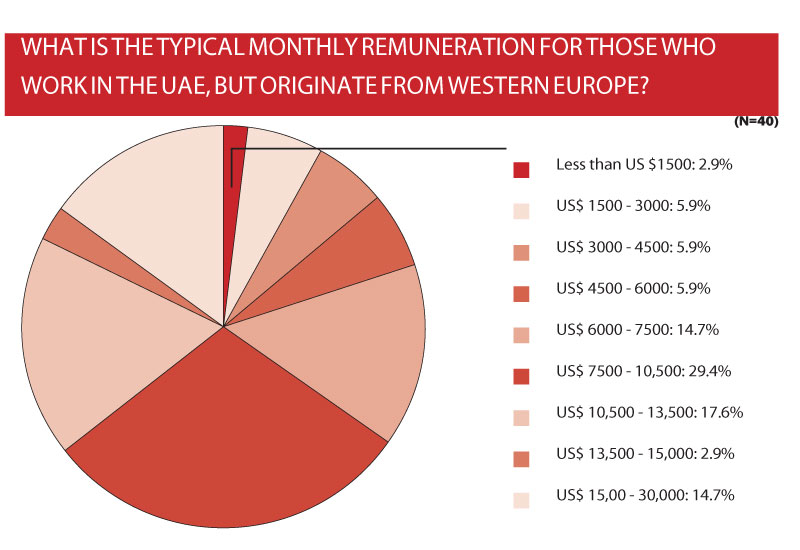 What is the typical monthly remuneration for those who work in the UAE, but originate from Western Europe?
What is the typical monthly remuneration for those who work in the UAE, but originate from Western Europe?
MONTHLY REMUNERATION
The impact of the downturn on salaries can be seen when compared to the 2009 survey. Those earning less than US $1500 rose from 9.5% of respondents to 12.7%. Furthermore, those earning $1500 to $2000 increased from 21.8% to 22.4%, while those earning $3000 to $4500 dropped from 18.7% to 16.6%.
However, while it could be argued that many middle-range earners witnessed salary decreases, there were significant gains in the high-earner categories.
The number of respondents earning $7500 to $10,500 increased from 6.7% to 13.7%. Some possible causes of the apparent drop in mid-range salaries could be explained by mid-management redundancies and a pushing of salaries both up and down with job title repositioning.
When looking at the competitiveness of their salaries, 66.5% of respondents thought their pay was average for the region, however, much like the 2009 survey revealed, 46.2% believed when compared to their global counterparts, their pay was below average.

Advertisement
PAY RISES AND PROMOTIONS
Despite many people having a year they would like to forget, a lucky 49.3% received a pay rise in the last 12 months. Just over a quarter of respondents (26.9%) were also promoted in the same period.
However, for more than half of those who took the survey (52.3%) it has been more than two years since they were last promoted.
A further 40.6% are assuming they will be getting a promotion within the next year, with 36% thinking they will be promoted between one and two years.
A rather pessimistic/realistic/lazy 8.1% concluded it will be more than three years before they expect a promotion. However, this figure includes those at the top of the pile!
WORKING CONDITIONS
It is very rare that a hospitality job is ‘nine to five’ and 65% of respondents work more than 50 hours a week, with 29.9% working 40 to 50 hours. However, these figures represent a drop from 67.5% and 28% respectively last year.
Furthermore, those working less than 30 hours a week rose from 0.6% to 1%.
Although these are certainly long hours, 71.9% of respondents received more than 25 days’ holiday a year, a further 17.9% claiming 21 to 25 days’ holiday.
EMPLOYEE SENTIMENT
Employee sentiment has produced a mixed bag of results when compared to last year’s survey.
The good news is that those looking to the future with complete confidence has risen from 45.3% to 51.6%. Almost 40% of respondents in 2009 said they felt less secure than they did six months before, but the 2010 survey has revealed that 15.2% feel more secure than they did 12 months ago.
Interestingly, the number of people who are anxious over keeping their jobs has increased from 8.8% in 2009 to 12.5%. However, this was offset by a reduction in those who believe they will be made redundant in the next six months from 3.7% to 1.6% and a drop in those who have already been told they will be made redundant from 2.7% to 1.1%.
While 34.2% said they would leave their current job for a higher salary, unsurprisingly this figure rose to 55.8% if you only look at those who thought their salary was below average for the region.








 Search our database of more than 2,700 industry companies
Search our database of more than 2,700 industry companies









